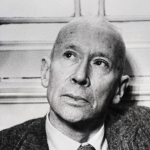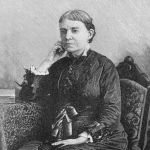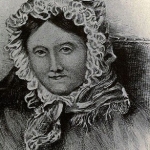As rising from the vegetable world
My Theme ascends, with equal Wing ascend,
My panting Muse; and hark, how loud the Woods
Invite you forth in all your gayest Trim.
Lend me your song, ye Nightingales! oh pour
The mazy-running Soul of Melody
Into my varied Verse! while I deduce,
From the first Note the hollow Cuckoo sings,
The Symphony of spring, and touch a Theme
Unknown to Fame, the passion of the Groves.
When first the Soul of love is sent abroad,
Warm thro the vital Air, and on the Heart
Harmonious seizes, the gay Troops begin,
In gallant Thought, to plume the painted Wing;
And try again the long-forgotten Strain,
At first faint-warbled. But no sooner grows
The soft Infusion prevalent, and wide,
Than, all alive, at once their joy o’erflows
In Musick unconfin’d. Up-springs the Lark,
Shrill-voic’d, and loud, the Messenger of Morn;
Ere yet the Shadows fly, he mounted sings
Amid the dawning Clouds, and from their Haunts
Calls up the tuneful Nations. Every Copse
Deep-tangled, Tree irregular, and Bush
Bending with dewy Moisture, o’er the Heads
Of the coy Quiristers that lodge within,
Are prodigal of harmony. The Thrush
And Wood-lark, o’er the kind contending Throng
Superior heard, run thro’ the sweetest Length
Of Notes; when listening Philomela deigns
To let them joy, and purposes, in Thought
Elate, to make her night excel their Day.
The Black-bird whistles from the thorny Brake;
The mellow Bullfinch answers from the Grove:
Nor are the Linnets, o’er the flow’ring Furze
Pour’d out profusely, silent. Join’d to these
Innumerous Songsters, in the freshening Shade
Of new-sprung Leaves, their Modulations mix
Mellifluous. The Jay, the Rook, the Daw,
And each harsh Pipe discordant heard alone,
Aid the full Concert: while the Stock-dove breathes
A melancholy Murmur thro’ the whole.
’Tis Love creates their Melody, and all
This Waste of music is the Voice of Love;
That even to Birds, and Beasts, the tender Arts
Of pleasing teaches. Hence the glossy kind
Try every winning way inventive Love
Can dictate, and in Courtship to their Mates
Pour forth their little Souls. First, wide around,
With distant Awe, in airy Rings they rove,
Endeavouring by a thousand Tricks to catch
The cunning, conscious, half-averted Glance
Of their regardless Charmer. Should she seem
Softening the least Approvance to bestow,
Their Colours burnish, and by hope inspir’d,
They brisk advance; then, on a sudden struck,
Retire disorder’d; then again approach;
In fond rotation spread the spotted Wing,
And shiver every Feather with Desire.
Connubial Leagues agreed, to the deep Woods
They haste away, all as their Fancy leads,
Pleasure, or food, or secret Safety prompts;
That Nature’s great Command may be obey’d,
Nor all the sweet Sensations they perceive
Indulg’d in vain. Some to the Holly-Hedge
Nestling repair, and to the Thicket some;
Some to the rude Protection of the Thorn
Commit their feeble Offspring. The cleft Tree
Offers its kind Concealment to a Few,
Their Food its Insects, and its Moss their Nests.
Others apart far in the grassy Dale,
Or roughening Waste, their humble Texture weave.
But most in woodland Solitudes delight,
In unfrequented Glooms, or shaggy Banks,
Steep, and divided by a babbling Brook,
Whose Murmurs soothe them all the live-long Day,
When by kind Duty fix’d. Among the Roots
Of Hazel, pendant o’er the plaintive Stream,
They frame the first Foundation of their Domes;
Dry Sprigs of Trees, in artful Fabrick laid,
And bound with Clay together. Now ’tis nought
But restless Hurry thro the busy Air,
Beat by unnumer’d Wings. The Swallow sweeps
The slimy Pool, to build his hanging house
Intent. And often, from the careless Back
Of Herds and Flocks, a thousand tugging Bills
Pluck hair and Wool; and oft, when unobserv’d,
Steal from the Barn a Straw: till soft and warm,
Clean, and compleat, their Habitation grows.
As thus the patient Dam assiduous sits,
Not to be tempted from her tender Task,
Or by sharp Hunger, or by smooth Delight,
Tho the whole loosen’d Spring around Her blows,
Her sympathizing Lover takes his Stand
High on th’ opponent Bank, and ceaseless sings
The tedious time away; or else supplies
Her place a moment, while she sudden flits
To pick the scanty Meal. Th’ appointed Time
With pious Toil fulfill’d, the callow Young,
Warm’d and expanded into perfect life,
Their brittle Bondage break, and come to Light,
A helpless family, demanding Food
With constant Clamour. O what Passions then,
What melting Sentiments of kindly Care,
On the new Parents seize! Away they fly
Affectionate, and undesiring bear
The most delicious Morsel to their Young,
Which equally distributed, again
The Search begins. Even so a gentle Pair,
By Fortune sunk, but form’d of generous Mold,
And charm’d with Cares beyond the vulgar Breast,
In some lone Cott amid the distant Woods,
Sustain’d alone by providential heaven,
Oft, as they weeping eye their infant Train,
Check their own Appetites and give them all.
Nor Toil alone they scorn: exalting Love,
By the great father of the Spring inspir’d,
Gives instant courage to the fearful Race,
And to the simple Art. With stealthy Wing,
Should some rude Foot their woody Haunts molest,
Amid a neighbouring Bush they silent drop,
And whirring thence, as if alarm’d, deceive
Th’ unfeeling School-Boy. Hence, around the Head
Of wandering Swain, the white-wing’d Plover wheels
Her sounding Flight, and then directly on
In long Excursion skims the level Lawn,
To tempt him from her Nest. The Wild-Duck, hence,
O’er the rough Moss, and o’er the trackless Waste
The Heath-Hen flutters, (pious Fraud!) to lead
The hot pursuing Spaniel far astray.
Be not the Muse asham’d, here to bemoan
Her Brothers of the Grove, by tyrant Man
Inhuman caught, and in the narrow Cage
From Liberty confin’d, and boundless Air.
Dull are the pretty Slaves, their Plumage dull,
Ragged, and all its brightening Lustre lost;
Nor is that sprightly Wildness in their Notes,
Which, clear and vigorous, warbles from the Beech.
Oh then, ye Friends of Love and Love-taught Song,
Spare the soft Tribes, this barbarous Art forbear!
If on your Bosom innocence can win,
Music engage, or Piety persuade.
But let not chief the Nightingale lament
Her ruin’d Care, too delicately fram’d
To brook the harsh Confinement of the Cage.
Oft when, returning with her loaded Bill,
Th’ astonish’d mother finds a vacant Nest,
By the hard Hand of unrelenting Clowns
Robb’d, to the Ground the vain Provision falls;
Her Pinions ruffle, and low-drooping scarce
Can bear the Mourner to the poplar Shade;
Where, all abandon’d to despair, she sings
Her Sorrows thro the Night; and, on the Bough,
Sole-sitting, still at every dying Fall
Takes up again her lamentable Strain
Of winding Woe; till wide around the Woods
Sigh to her Song, and with her Wail resound.
But now the feather’d Youth their former Bounds,
Ardent, disdain; and, weighing oft their Wings,
Demand the free Possession of the sky.
This one glad Office more, and then dissolves
Parental Love at once, now needless grown.
Unlavish Wisdom never works in vain.
’Tis on some Evening, sunny, grateful, mild,
When nought but Balm is breathing thro the Woods,
With yellow Lustre bright, that the new Tribes
Visit the spacious Heavens, and look abroad
On Nature’s Common, far as they can see,
Or wing, their Range, and Pasture. O’er the Boughs
Dancing about, still at the giddy Verge
Their Resolution fails; their Pinions till,
In loose Libration stretch’d, to trust the Void
Trembling refuse: till down before them fly
The Parent-Guides, and chide, exhort, command,
Or push them off. The surging Air receives
The Plumy Burden; and their self-taught Wings
Winnow the waving Element. On Ground
Alighted, bolder up again they lead,
Farther and farther on, the lengthening Flight;
Rouz’d into Life and Action, light in Air
Th’ acquitted Parents see their soaring Race,
And once rejoicing never know them more.





















Comment form: